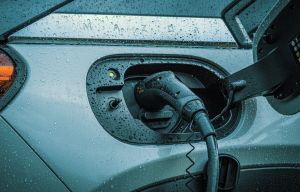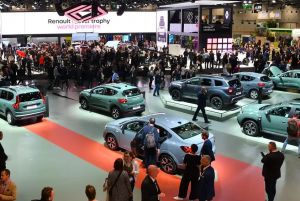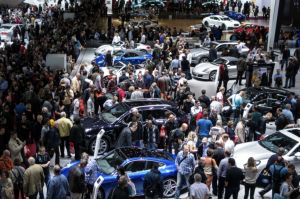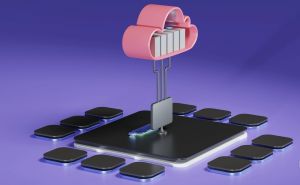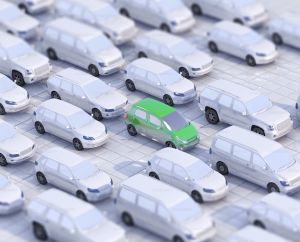Test Owner
ZF Hungary, a subsidiary of the German automotive supplier ZF, has announced plans to cut 110 jobs at its Hungarian facility. The decision comes in response to the downturn in the European automotive sector and declining orders. This restructuring aligns with ZF’s broader strategy, as its German parent company aims to reduce its workforce by 20%—amounting to 11,000 job cuts—by 2028 due to the challenges posed by the shift to electric vehicles (EVs).
Despite Hungary's heavy reliance on the German market, the country’s major automotive manufacturers have so far been largely unaffected by the slowdown. However, suppliers have experienced a gradual but consistent reduction in jobs, mainly affecting temporary and contracted workers. Industry experts warn that further job losses may be inevitable if demand does not recover in the coming years.
The job cuts at ZF Hungary represent a significant shift, marking the first major reduction at a Tier 1 supplier directly linked to Germany’s automotive sector slowdown, according to economic news portal G7.hu. This signals potential difficulties ahead for Hungary’s broader automotive supply chain, which heavily depends on Germany’s vehicle production trends.
Just 15 months prior, ZF Hungary announced a HUF 24 billion (€60 million) investment to produce shock absorbers and rear axles for EVs. These components were set to be manufactured from 2025 at BMW’s plant in Debrecen and Mercedes’ factory in Kecskemét. However, with the current downturn, there are concerns about whether projected production levels will be maintained as planned.
Recent production data highlights a 13.5% year-on-year decline in automotive industry output in November, with an overall drop of 8% between January and November. Despite this downturn, Hungary’s automotive industry has maintained consistent growth over the past decade, often posting double-digit annual increases. The sector’s total production value reached HUF 13 trillion (€32.3 billion) at the end of 2023, accounting for 18% of the country’s GDP.
Hungary’s manufacturing sector has demonstrated resilience, weathering the 2022 energy crisis and the subsequent recession. Data from the Central Statistical Office (KSH) indicates that employment in the sector remained stable up to September 2024, with a slight increase compared to the beginning of the year. However, analysts caution that prolonged difficulties in the German market could lead to broader employment challenges in Hungary’s automotive sector.
Labour market conditions have eased, as the number of unfilled positions dropped from 17,000 to 13,000 in the 12 months leading to Q3 2024. While this suggests a temporary stabilization, concerns persist about the potential for further workforce reductions if the industry fails to regain momentum.
According to a report by Eurofound, Hungary ranks among the EU nations with the highest proportion of automotive industry jobs, behind only Slovakia, the Czech Republic, and Romania. This heavy reliance on the sector underscores the importance of maintaining stability and competitiveness in an increasingly uncertain European market.
With ongoing transformations in the global automotive industry, including the transition to electric mobility and evolving consumer demand, Hungary’s suppliers must navigate an increasingly complex landscape. Industry stakeholders emphasize the need for strategic investments, innovation, and diversification to mitigate the risks posed by external market fluctuations.
Swedish EV battery maker Northvolt has agreed to sell its stake in Novo Energy, its joint venture with Volvo Cars, as part of a broader effort to streamline operations and explore new opportunities in North America. The financial terms of the deal remain undisclosed, and the transaction is subject to approval by a U.S. bankruptcy court.
Northvolt’s Strategic Shift Amid Financial Challenges
Northvolt, which has been under U.S. bankruptcy protection, halted funding for most of its joint ventures in 2024 to sustain its core battery cell production business. This decision led Volvo to declare Northvolt in breach of contract in October, prompting the automaker to acquire full control of Novo Energy.
The deal marks another step in Northvolt’s cost-cutting strategy, which has included divesting projects in Poland and Norway to prioritize its main battery plant in northern Sweden. Despite its ambitions to build gigafactories in Germany and Canada, the company has faced delays and funding challenges. With its cash reserves expected to run dry in February, Northvolt is actively seeking new investors.
Formed in 2021, Novo Energy was envisioned as Europe’s best hope for a domestic EV battery powerhouse, with plans to build a dedicated battery factory in Gothenburg, Sweden. However, amid financial difficulties, Volvo announced in October that it would need a new partner to keep the factory’s 2026 production start on track. The automaker has not provided further updates on its search.
In January, Novo implemented cost-cutting measures, including a 30% reduction in staff. Despite the changes, a Novo spokesperson acknowledged Northvolt’s vital role in the venture’s progress:
“Northvolt’s expertise has been instrumental in Novo’s development. Moving forward, we will work with Volvo Cars to evaluate a future technological partner for our gigafactory,” the spokesperson said.
Northvolt Eyes North American Market Amid Quality Concerns
Northvolt has struggled with production challenges and quality issues, leading BMW to cancel a €2 billion ($2.08 billion) contract in 2023. These setbacks have raised concerns among investors about Northvolt’s ability to fulfill its commitments.
While Volvo’s acquisition of Novo means Northvolt will lose future battery orders from the automaker, the companies have agreed to explore supply opportunities in North America.
“The framework agreement with Volvo Cars underscores continued market interest in Northvolt. This opens up new possibilities for supply at our upcoming Northvolt Six facility in Montreal,” a Northvolt spokesperson stated.
As Northvolt shifts its focus beyond Europe, its next steps will determine whether it can overcome financial struggles and regain momentum in the global EV battery race.
BMW is ushering in a new era of electrification with its Neue Klasse platform, starting with the pre-production of an electric SUV that will replace the iX3. The manufacturing process has commenced at the company’s newly constructed plant in Debrecen, Hungary. Full-scale production is slated to begin in late 2025, marking a pivotal step for the automaker as it transitions to increasingly electrified vehicles.
The Neue Klasse Platform: A Defining Moment
The Neue Klasse moniker, originally used in the 1960s for a series of transformative models that redefined BMW’s image, has been revived to signal a similar turning point. This new platform is designed to replace BMW’s CLAR architecture, which underpins a broad range of models, from the 2 Series to the flagship X7. While CLAR-based vehicles will remain in production until the end of the decade, Neue Klasse will gradually take over as the backbone of BMW’s lineup.
The new platform is expected to offer modularity and flexibility, though questions remain about whether it will exclusively support electric vehicles (EVs). BMW may be hedging its bets by designing the platform to accommodate range-extender EVs, a nod to its expertise with models like the i3 Rex.
Expansion of Global Production
The Debrecen facility represents BMW’s commitment to scaling up Neue Klasse production globally. Pre-production vehicles, codenamed NA5, are already being assembled at the plant. The first customer-ready units are expected to roll off the production line in late 2025. This electric SUV will also be produced in other facilities, including BMW’s expanded plant in Mexico, which currently builds the CLAR-based 3 Series. Production in Mexico will begin in 2027, two years after the Hungarian facility starts delivering customer vehicles.
The company's $800 million investment in its Mexican plant underscores the strategic importance of this global rollout. Additional Neue Klasse models are expected to follow, further integrating the platform into BMW’s global manufacturing strategy.
The Electric SUV: A Glimpse at the Future
Leaked patent drawings published by Autoweek provide a glimpse of the design for the upcoming SUV. The vehicle retains a resemblance to the futuristic Vision Neue Klasse X concept but adopts a more practical and subdued design for production. This SUV exemplifies BMW’s approach to blending innovation with market-ready features as it seeks to capture the growing EV market.
Challenges in the Path to Electrification
While BMW has set ambitious targets for electrification, the journey hasn’t been without challenges. Last year, the company expressed confidence in achieving 50% EV sales well before its 2030 deadline. However, with EV adoption slower than anticipated in many markets outside of China, that goal now appears more uncertain.
Despite these hurdles, BMW remains committed to electrification, with the Neue Klasse platform serving as a cornerstone of its strategy. The automaker’s balanced approach includes continuing to develop combustion engine models alongside its EV lineup. Spy photos of the next-generation 3 Series, codenamed G50, reveal a combustion engine variant built on an updated CLAR platform, set to debut in 2027. This model will be sold alongside the all-electric i3, derived from the Vision Neue Klasse concept.
A Gradual Transition to the Future
BMW’s transition to Neue Klasse architecture will be deliberate, ensuring continuity with its current lineup while paving the way for future innovations. The combination of global production expansion, flexible platform design, and the introduction of cutting-edge EVs positions the automaker to compete in a rapidly evolving market.
As BMW moves forward with the Neue Klasse platform, it is not just manufacturing new vehicles but redefining its vision for the future of mobility. With the Debrecen plant leading the charge, the next chapter of BMW’s electrification journey is well underway.
The financial collapse of Northvolt has delivered a significant setback to Europe’s efforts to establish a competitive electric vehicle (EV) battery industry. This has sparked discussions about whether the continent needs to take stronger action to attract investment, as European startups struggle to keep pace with dominant Chinese rivals.
Northvolt, long regarded as Europe’s leading hope for EV battery production, filed for U.S. Chapter 11 bankruptcy protection on Thursday after failing to secure additional funding from investors and creditors, including Volkswagen and Goldman Sachs.
A Painful Blow to Europe’s Battery Aspirations
Founded in 2016 with the ambitious motto “make oil history,” the Swedish company has raised over $10 billion in equity, debt, and public financing. Both Volkswagen and Goldman Sachs each own around 20% of its shares. Despite these resources, Northvolt announced on Friday that it needs $1.0-$1.2 billion in new funding to complete its restructuring process by the end of March.
In a bid to stabilize its finances, Northvolt recently downsized its operations and cut jobs. However, it has faced ongoing challenges, including producing high-quality batteries at scale and losing a €2 billion ($2.1 billion) contract with BMW in June.
These struggles cast doubt on Europe’s ability to build a robust domestic battery supply chain. Over the past decade, Northvolt led a wave of European startups investing tens of billions of dollars to support the region’s automakers as they transition from internal combustion engines to EVs.
Falling Behind Global Competitors
Despite these efforts, EV demand has grown more slowly than anticipated, while China has maintained a commanding lead in battery production. According to the International Energy Agency, China controls 85% of global battery cell manufacturing.
Battery production is a complex and delicate process, especially at scale. Northvolt’s difficulties in meeting its own targets and reducing production at its Swedish battery cell plant illustrate the challenges.
“Batteries are incredibly difficult to make, and Northvolt hasn’t met its customers’ supply demands—this is a management issue,” said Andy Palmer, founder of Palmer Automotive. “The Chinese are 10 years ahead of the West in battery technology. That’s a fact.”
Northvolt’s struggles are part of a broader trend. At least eight companies have delayed or canceled EV battery projects in Europe this year, including China’s Svolt and the ACC joint venture between Stellantis and Mercedes-Benz. Benchmark Minerals data indicates that Europe’s battery pipeline capacity for 2030 has dropped by 176 gigawatt-hours in 2024—nearly equivalent to the continent’s entire current installed capacity.
Calls for Strategic Rethinking
Some industry leaders argue that Europe needs to provide stronger support for domestic battery projects to compete with Chinese giants like CATL and BYD.
“Europe must rethink its approach to supporting the battery sector before China takes over the entire value chain,” said James Frith, European head of Volta Energy Technologies.
Northvolt’s $5.8 billion in debts include $313 million owed to the European Investment Bank (EIB). EIB Vice President Thomas Östros emphasized that the bank would protect its interests while monitoring the situation closely.
“Europe has a strategic interest in a domestic battery industry for electric cars, but it’s too early to predict the outcome,” he stated.
A Crossroads for Europe
Sweden’s government has ruled out taking a stake in Northvolt, but the company’s co-founder and outgoing CEO Peter Carlsson expressed concern about Europe losing its competitive edge.
“I’m a little worried Europe is giving up on its dream of competing with China,” Carlsson said. “We’ll regret this in 20 years if we retreat now.”
Carlsson acknowledged that the EV transition faces challenges, including uncertainty from automakers, policymakers, and investors. “It’s not a straight path,” he said. “We’re in a difficult phase where doubts and hesitations are slowing progress.”
As Northvolt fights for survival, the broader question remains: can Europe find the resolve to build its EV battery industry, or will it cede dominance to China?
Car enthusiasts from across the globe have gathered at Paris’ Porte de Versailles for a week of electric vehicle (EV) excitement, showcasing the most innovative concepts and models in the automotive world. This storied biennial event, which dates back to 1898, is renowned for spotlighting the latest breakthroughs in auto technology.
After the COVID-19 cancellation in 2020 and a scaled-back version in 2022, the 2024 show marks a robust comeback, featuring prominent automakers from Europe, the UK, Asia, and North America revealing their newest creations.
European Premieres: Showcasing Innovation
The show commenced with headline-worthy world premieres from Europe’s leading EV manufacturers. French automaker Renault introduced its 4 E-Tech Electric, an electric crossover SUV labeled a "voiture à vivre" or "car for living." This model boasts a generous 1,045-litre trunk capacity and is designed for versatile adventures.
Citroën, under the Stellantis group, unveiled four significant new models, signaling what it called “a new era.” This lineup includes updated versions of the C4 and C4X, as well as the new C5 Air Cross—an aerodynamic, multi-energy SUV tailored for family use. Citroën also revealed an upgraded version of its popular Ami microcar, with front and rear enhancements to emphasize its friendly and approachable design, ahead of its 2025 release.
From Germany, BMW impressed attendees with a revamped MINI John Cooper Works, now equipped with “go-kart mode,” delivering an extra 20-kilowatt boost for powerful acceleration and overtaking. The automaker also showcased its futuristic Neue Klasse electric vehicle, which features a windshield display that projects essential driving information and incorporates an AI assistant to enhance the driving experience.
AI-Powered Cars Steal the Spotlight
AI technology was at the forefront as Chinese automakers presented models with built-in intelligence designed to support and eventually surpass conventional driver assistance systems. Stellantis’ Leapmotor introduced the B10, a compact crossover SUV that integrates their proprietary "Leap 3.5 architecture." This platform supports advanced driver assistance, a high-tech digital cockpit, and intelligent driving features. Production for this model will take place in Poland, with an expected launch in 2025.
XPeng, another major Chinese player, revealed the P7+, which they call the world’s first “AI-defined” car. According to Xiaopeng He, chairman and CEO, the vehicle incorporates an advanced assistance system capable of making autonomous decisions, acting as a “companion or mobile butler.” The P7+ adapts to drivers’ individual habits and preferences, learning over time to offer a tailored driving experience. Its AI system is powered by XPeng’s in-house designed “Turing chip,” which is crucial for developing their bespoke AI models.
This push for AI integration follows French President Emmanuel Macron’s comments on the challenges faced by French and EU automakers due to stiff competition from China.
Beyond Cars: Unique Green Tech on Display
The Paris Motor Show didn’t limit itself to traditional EVs. Visitors were treated to a display of innovative green technology spanning various sectors. French manufacturers highlighted “license-free” electric microcars, which can be driven by individuals as young as 14 without a standard driver’s license. Renault’s Duo and Bento models, small two-seaters with a range of up to 161 km per charge, exemplified this trend.
The show also featured an impressive example of sustainable aviation with a 100% green electric plane, showcasing the future of eco-friendly transport beyond the road.
With this blend of groundbreaking EVs, AI-driven cars, and green innovations, the 2024 Paris Motor Show reestablished itself as a premier event for cutting-edge automotive technology.
The 90th Paris Motor Show, running from Monday to Sunday, offers a unique window into global automotive trends. Despite the European Union's decision to impose steep anti-subsidy tariffs on Chinese electric vehicles, prominent Chinese automakers like BYD, Hongqi, and Leapmotor are actively showcasing their latest innovations at the event. This contrast is striking, demonstrating that European protectionism has not deterred Chinese auto companies from pursuing the European market or stifled the industry’s drive for cooperation and innovation.
As the world’s first auto exhibition, the Paris Motor Show—established in 1898—carries undeniable influence in the sector. Its emphasis this year on "immersion, innovation, and passion" reflects the critical role that innovation plays in shaping the future of the industry. The event highlights cutting-edge technologies, from electric and hybrid vehicles to hydrogen fuel cells and intelligent vehicle systems that transform cars into mobile smart terminals. Major players such as Renault, Peugeot, Volkswagen, BMW, Kia, Ford, and Tesla will all be present, showcasing their unique advancements alongside their Chinese counterparts.
China's "Intelligent Manufacturing" has already made a mark at previous industry events, including the 2022 Paris Motor Show and last year’s Munich Auto Show, where Chinese companies' growing strength in the new-energy vehicle (NEV) market was on full display. Although China is a relative newcomer to the automotive world—especially compared to established players like Europe, the US, and Japan—it has quickly gained ground, particularly in the NEV sector. Nevertheless, its market share in Western countries remains limited, and gaps persist in key technologies. Chinese participation in the Paris Motor Show underscores the desire to break through trade barriers and foster deeper global cooperation, challenging perceptions that they pose a "threat" to established markets.
The global automotive industry is engaged in an "innovation race," with Europe and the US appearing to overreact to competition from China. While the Paris Motor Show emphasizes innovation, European leaders also realize that maintaining a competitive edge requires technological progress rather than protectionism. In fact, China’s rise in the industry has been fueled by open competition and collaboration with foreign brands. The show’s open stance towards Chinese exhibitors highlights a consensus within the global auto sector: innovation thrives on international cooperation. Joint efforts, particularly in expanding the green industry, are also essential to meet global emission reduction targets.
Against this backdrop, the European Commission’s proposal to impose tariffs on Chinese electric vehicles seems counterproductive. While such tariffs will undoubtedly challenge Chinese automakers, they may also spur these companies to double down on innovation and brand development, eventually earning global recognition through superior products. On the other hand, European automakers are already grappling with the challenges of industry transformation. Imposing tariffs could raise costs for imported parts, creating supply chain disruptions and hindering Europe’s own technological progress. The EU must reconsider its development strategy, as protectionist barriers cannot keep pace with the global demand for collaboration and innovation in the automotive sector.
For Chinese car companies, participation in the Paris Motor Show underscores their commitment to the European market, a crucial region for their global ambitions. Likewise, the emphasis Chinese firms place on Europe highlights the strategic importance of the region itself. The ongoing dispute between China and the EU over the anti-subsidy investigation into Chinese EVs could be resolved through constructive dialogue, ultimately benefiting both sides. Consultations on this issue have already spanned over 20 days, with significant differences still remaining. China has expressed sincerity in negotiations but remains firm, urging the EU to meet them halfway.
In the early days of the automobile, European countries resisted change by enacting laws that prioritized horse-drawn carriages over cars—a historical irony now seen as laughable. Today, using protectionism to shield industries from competition seems like a modern-day equivalent of the "horse-drawn carriage protection law." Hopefully, the EU will realize this sooner rather than later. The automotive industries of China and Europe are highly complementary, and the potential for cooperation is vast. By working together, both sides could build a mutually beneficial future in this rapidly evolving industry.
Hungary is fully committed to fostering strong cooperation between German car manufacturers and Eastern suppliers, a crucial factor in the success of the electric vehicle (EV) transition, according to Minister of Foreign Affairs and Trade Péter Szijjártó recently.
Following talks with Andreas Radé, Managing Director of the German Association of the Automotive Industry (VDA), and Thomas Schwarz, Head of the Audi Representative Office in Berlin, Minister Szijjártó highlighted the profound technological transformation currently taking place in the automotive industry. German automakers are investing heavily in the shift towards electric vehicles, with tens of billions of euros directed towards research and development (R&D) for the electric transition.
“Hungary is a prime example of how this transformation can succeed both nationally and at the company level, provided that international trade remains free and economic cooperation is unimpeded,” Szijjártó stated. He warned that obstructing East-West business collaboration would threaten this progress.
Criticism of EU’s Proposal on Chinese Car Tariffs
Szijjártó also criticized the European Commission's recent proposal to impose tariffs on Chinese car manufacturers, arguing that it undermines free trade and competition within the automotive industry. "This proposal could hurt the European economy more than it helps," he said, emphasizing that Hungary, during its upcoming EU presidency, will advocate for meaningful and mutually beneficial East-West cooperation.
He pointed out that in Hungary, German car manufacturers collaborate successfully with partners from China, South Korea, and other Eastern nations. Hungary is unique in hosting all three major German premium car manufacturers—Audi, BMW, and Mercedes-Benz—alongside five of the ten largest Eastern battery producers.
Strategic Cooperation with German Companies
Minister Szijjártó stressed that Hungary is well-positioned to facilitate this East-West cooperation, which bolsters the Hungarian economy and supports thousands of jobs. He emphasized the long-standing economic ties between Hungary and Germany, noting that Germany has been Hungary's largest trading partner for years. In 2023, bilateral trade hit a record high, exceeding 70 billion euros. German companies have also been the largest investors in Hungary.
"The Hungarian government has signed strategic cooperation agreements with 16 German companies and supported investments from 201 German firms over the past decade, creating nearly 40,000 new jobs," Szijjártó highlighted.
Hungary’s Role in the Electric Vehicle Transition
Szijjártó further underlined that the future success of the electric vehicle transition relies on free and open East-West cooperation, with competition at its core. "The German car industry has clearly chosen Hungary as a key partner in this transition," he concluded.
By maintaining an open market and fostering collaboration across borders, Hungary continues to play a pivotal role in driving the automotive industry's shift to electric vehicles, benefiting both the national economy and the broader European market.
In recent years, northern Sweden has emerged as one of the most attractive regions in the world for establishing large-scale data centers. This trend is driven by a unique combination of natural advantages, sustainability initiatives, and strategic governmental support. From small towns like Luleå to regional hubs like Boden, the north of Sweden has become a pivotal location for major global tech companies and a beacon for sustainable data management.
Natural Advantages of Northern Sweden
The geographic and climatic characteristics of northern Sweden make it an ideal location for data centers. One of the primary factors is the cold climate. Data centers generate massive amounts of heat from the operation of servers, and the cold weather in this part of Sweden reduces the need for artificial cooling, one of the largest operational costs for data centers. By using natural cooling techniques—often referred to as "free cooling"—operators can dramatically lower their energy consumption and, consequently, their carbon footprint.
Additionally, northern Sweden is rich in renewable energy resources, particularly hydropower. Sweden’s energy mix is already dominated by renewable sources, and the northern region is home to some of the largest hydropower plants in the country. This guarantees a reliable and eco-friendly electricity supply to data centers, aligning with the global push toward greener digital infrastructures.
Key Data Center Projects in Northern Sweden
Facebook’s Luleå Data Center
One of the most prominent examples of investment in the region is Facebook's data center in Luleå, which opened in 2013. It was the company’s first data center outside the United States, underscoring the strategic importance of Sweden for global tech giants. Facebook chose Luleå for several reasons, including its cool climate and access to renewable energy. The Luleå facility runs almost entirely on hydropower and uses a state-of-the-art system to recycle the excess heat generated by its servers to warm nearby buildings.The Luleå data center is also known for its energy efficiency, with an impressive Power Usage Effectiveness (PUE) ratio of around 1.07, meaning that nearly all the energy used in the center goes to running the equipment, with very little wasted on cooling and other overhead costs.
Boden Data Center
The nearby town of Boden has also seen significant investment in data infrastructure. The Boden Business Park hosts a variety of data centers and energy-efficient tech projects, including the Boden Type DC, a facility that focuses on sustainability by testing innovative, low-energy designs for data centers. This region, with its access to renewable energy and cooling technologies, has become a hub for pilot projects and startups specializing in green IT solutions.Hydrokraft and Renewable Energy Innovation
Alongside major tech companies, northern Sweden is also attracting companies focused on building data centers with cutting-edge renewable energy solutions. These facilities use a mix of hydropower, wind energy, and bioenergy to power their operations. For instance, smaller data centers are being designed to use excess energy generated by local factories or to operate off surplus renewable energy, further reducing their environmental impact.
Sustainability and Governmental Support
The Swedish government has actively supported the growth of data centers in the north through favorable policies and incentives. In 2017, Sweden introduced a significant tax cut on electricity for data centers, reducing the tax rate for power-intensive operations by 97%. This move not only attracted global companies but also boosted the domestic tech scene by encouraging smaller companies to set up data facilities in the country.
Moreover, the Swedish government has pushed sustainability initiatives in alignment with its goal of becoming one of the world’s first fossil-fuel-free nations. Data centers in northern Sweden benefit from this green agenda, which promotes the use of renewable energy, energy efficiency, and waste heat recovery. This has made northern Sweden a model for how digital infrastructure can be developed in harmony with environmental concerns.
Challenges and Future Prospects
While northern Sweden presents significant advantages for data centers, there are challenges as well. One of the major hurdles is the region’s relatively remote location, which can lead to difficulties in logistics, construction, and attracting a skilled workforce. However, the rise of remote working and increased investments in local education and infrastructure are helping to address these issues.
Looking ahead, the demand for data processing, storage, and cloud computing will continue to grow exponentially, driven by technologies like AI, IoT, and 5G. Northern Sweden’s data centers are well-positioned to meet this demand, offering not only sustainable energy solutions but also scalability for the future of the digital economy.
The combination of environmental sustainability, technological innovation, and strategic governmental support makes northern Sweden a global leader in the data center industry. The region’s natural advantages and forward-thinking policies will likely continue to attract companies seeking not just efficiency and cost savings, but also a sustainable way to power the data-driven future.
In a low-profile but significant development, the IT and cloud entity established by the German retailer Lidl in 2021 is now approaching €2 billion in annual revenue. Renamed Schwarz Digits after becoming independent in 2023, this business has quickly positioned itself as one of Europe’s leading cloud providers. By comparison, the French cloud provider OVH generated less than €900 million in revenue in 2023.
According to an article in the Financial Times, executives from the Schwarz Group, which boasts over €167 billion in annual revenue, draw parallels between their journey and that of Amazon. "We didn’t start with a commercial goal in mind; we just wanted to meet our own needs," explains Christian Müller, Co-CEO of Schwarz Digits. He adds that the entity is experiencing rapid growth, serving clients such as SAP, Bayern Munich football club, and the Port of Hamburg.
Investments in AI
When the group decided to move to the cloud, it sought a European solution to avoid storing data in foreign jurisdictions. However, it soon realized that no provider could fully meet its requirements. This led Schwarz Group, the parent company of Lidl, to develop its own cloud architecture, launched in 2021. The retailer quickly discovered that many other German companies shared its concerns: modernizing their IT on cloud architectures without becoming dependent on American or Chinese providers.
Schwarz Digits is active not only in cloud computing but also in cybersecurity, a field in which Schwarz Group has developed expertise through the acquisition of Israeli cybersecurity firm XM Cyber in 2021 for $700 million. Since then, the retailer has also invested in artificial intelligence (AI) through a partnership with the German start-up Aleph Alpha. In November of last year, Schwarz Group participated in a fundraising round for the German tech company.
Co-led by Christian Müller and Rolf Schumann, Schwarz Digits employs around 7,500 people and includes Schwarz IT (IT management), Schwarz Digital (development), StackIT (the in-house cloud service), XM Cyber, the e-commerce entities of Kaufland and Lidl stores, Schwarz Media, and a digital creative agency. The in-house cloud service recently received the C5 cybersecurity certification (Cloud Computing Compliance Criteria Catalogue) from Germany’s Federal Office for Information Security (BSI).
Software-Defined Vehicles: The Future of Cars is Here (Almost)
Get ready for cars that act more like computers on wheels. This year, automakers are making big strides towards software-defined vehicles (SDVs), but don't expect them in your driveway just yet. Experts say it will be at least 3 years before these high-tech cars hit the market.
What are SDVs and why are they exciting?
SDVs rely heavily on software to control everything from the engine to the entertainment system. This means features can be constantly updated and improved, keeping your car feeling new for longer. Plus, automakers can potentially earn extra cash by offering software subscriptions and services.
The race is on, but not everyone is ready
Car companies are at different stages in the SDV race. Some are well on their way, while others are just starting out. The next generation of vehicles won't be fully software-defined, but they'll be much more flexible than today's cars. This means you can expect frequent updates with new features.
How can automakers win the SDV race?
To succeed, car companies need to ditch their old ways of doing things. Here's what they need to do:
- Embrace change: They can't keep relying on the same methods that made them successful in the past.
- Partner up: Building an SDV requires a variety of skills. Automakers should collaborate with different partners instead of trying to do everything themselves.
- New leadership: Company leaders need to understand the importance of software and continuous improvement.
- Focus on the big picture: It's not just about software. Design, marketing, and a clear vision are all crucial.
- Engineering matters: Even with all the software, cars still need to be safe, reliable, and durable. Automakers can't neglect their core engineering expertise.
- Standardization is key: Right now, every automaker is doing their own thing with software platforms. More standard systems would make development easier.
The benefits of going digital
The move to SDVs means cars can be updated much faster. Imagine adding new features like chat applications in just weeks, not years. This keeps your car feeling fresh and opens doors for new revenue streams for automakers, like offering subscriptions for desired features.
Ultimately, what features become popular will depend on what customers are willing to pay for. Some might pay for features that make their car a mobile office, while others might prefer in-car gaming experiences.




